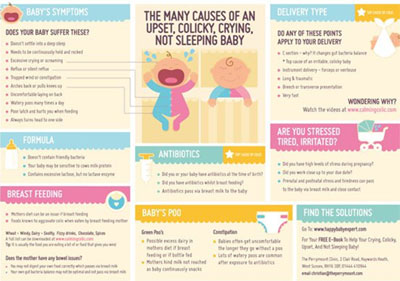
Can the speed of birth determine whether your child has colic?
It interested me to find this piece of research that found that babies born from faster births had more colic.
If I had been asked whether a long or faster birth gave more colic I think I may have gone for faster too as I have had some extremely distressed babies come to see me after very fast births. The ultimate fast birth being a planned c-section delivery and in Calming Colic I speak about this causing colic in more detail and other traumas for the child.
These are the basic results of the research. A group of 40 mothers were asked about the duration of their labour. In those who had a baby with colic the average length of delivery was 9.7 hours and those without colicky babies the average length was 14.3 hours. So colicky babies had quicker births.
I have a few thoughts on this. Firstly, it’s interesting research whether it is right or wrong and I have an opinion both ways but secondly, does it really matter?! At the end of the day every one wants a nice, easy untraumatic birth and that is what you are aiming for, you aren’t really going to try for a longer birth just to have a baby with less colic! Having said this, from my position it is another factor to add to the mix of the causes behind colic. As you know if you read my Blog, Facebook, Twitter or have read Calming Colic I look at every baby individually to assess the many factors behind colic and apply different approaches to each one.
So this research says that faster births create more colicky babies. The researchers say they don’t know why. I’m not sure either really but I can say that I have seen very colicky and upset babies from fast births. I believe that going from a lovely homely place inside your mothers womb to being popped out extremely fast is probably quite a shock! And research has shown that stress does increase the chances of colic. It is also recognised by the medical profession that c-section babies have a mucous build up as the compressions from a vaginal delivery does not squish the fluid it out of the baby. My conclusion from this is that the medical profession recognise a difference in delivery styles, so who is to say that it is only mucous build up that is a side effect of fast or c-section deliveries. I certainly find that upset and cranky unsettled babies are more likely to have had a fast birth.
Let’s look at the opposite now, a long birth. This too makes sense. A long birth has put more contractions and strain on the baby. Many babies have their head engaged and the contractions are forcing down on them and they don’t go anywhere, which is quite distressing! In Calming Colic I describe how these birth compressions can cause and aggravate colic and how as a cranial osteopath I help relieve them. Also long births that are not progressing tend to end in a c-section, forceps or vonteuse deliveries, all of which I have found to be factors in colic.
To conclude then, I like this research as it is investigating a factor I see to be an influence on colic. It happens to come up with a conclusion of faster births causing more colic, I agree with this but I also agree with longer births aggravating colic too. So what is my conclusion? Maybe somewhere in the middle is a birth that doesn’t cause colic, not too long but not too short. Either way as a mother giving birth you have better things on your mind then popping your baby out at a specific time. But from this Blof you can take away that if your delivery was very fast or very long then there is an increased chance of colic in your newborn, this however is only one of the causes behind colic I look in to.
Infants with colic may have had a faster delivery: a short, preliminary report:
Journal of Manipulative and Physiological Therapeutics Volume 23, Issue 3 , Pages 208-210, March 2000 Jesper M.M. Wiberg, DC, Neils Nilsson, DC, MD, PhD





No Comments